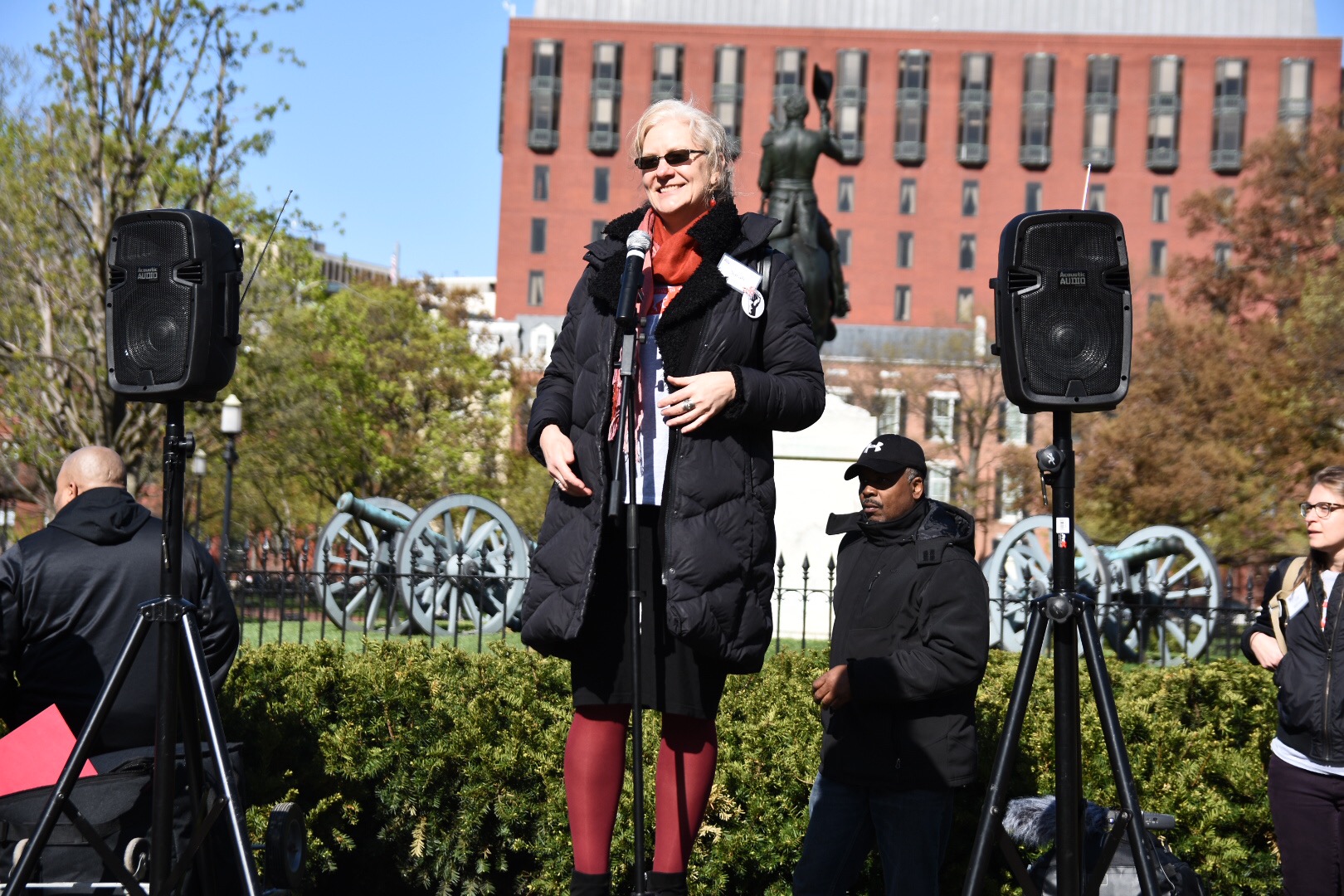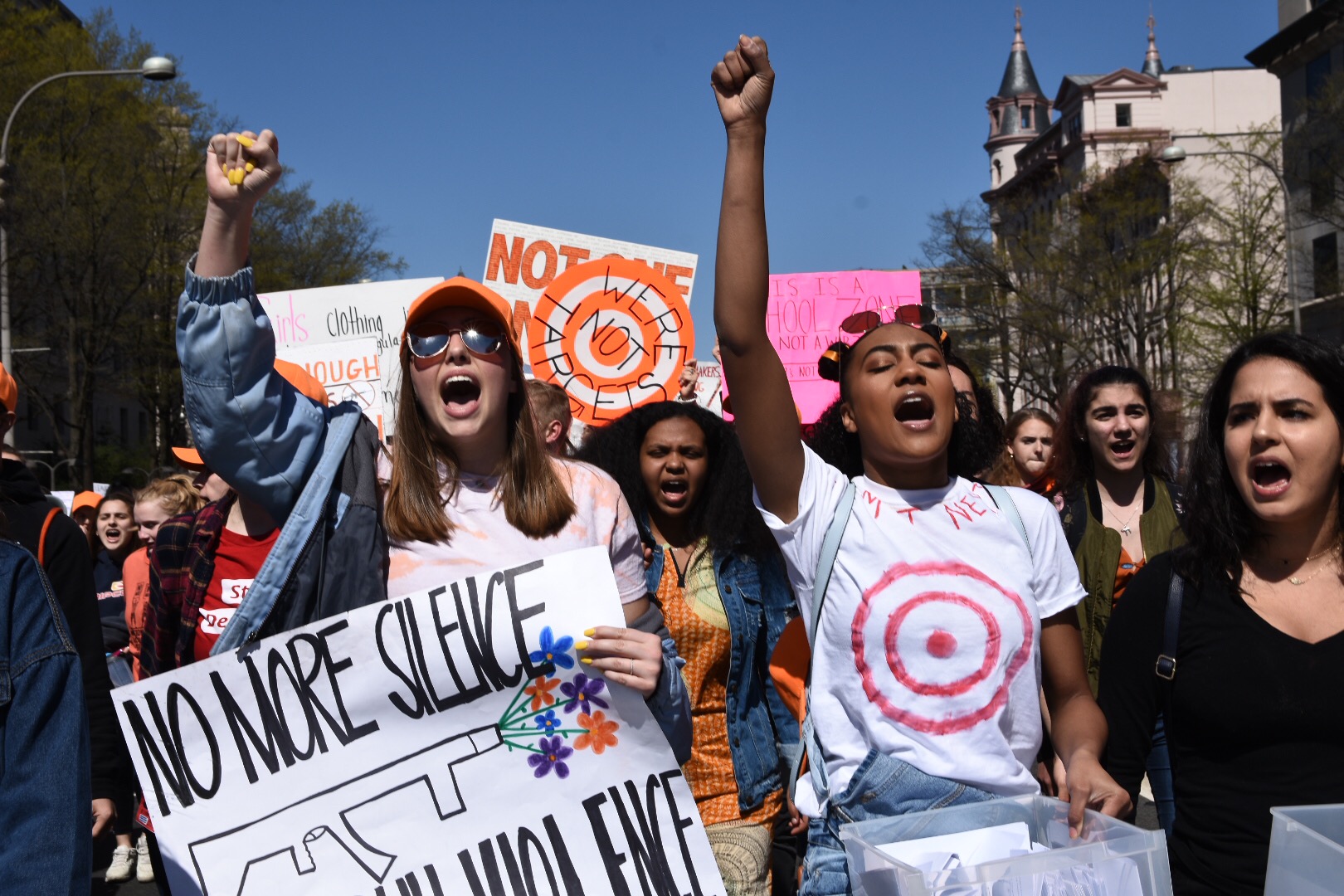WASHINGTON, D.C. — “My country ’tis of quivering child’s breath, held in a closet.”
The White House sidewalk is no stranger to protest. But where you might normally find signs, flags, and hearty chanting, Friday’s activist lineup featured something a bit different: poetry.
A few dozen people closely gathered around a makeshift stage in Lafayette Square as the nation’s capital buzzed to life on a cool spring morning. Sarah Browning took the stand. She’s a poet and activist who co-founded Split This Rock, a collective of socially engaged poets on a mission to promote poetic form that, according to its website, “bears witness to injustice and provokes social change.”
In just under an hour, they’d join hundreds of Washington, D.C. students leaving class outside the White House in the second mass walkout against gun violence in recent weeks, held on the anniversary of the 1999 Columbine High School shooting, which resulted in the deaths of 12 students and one teacher. Exactly 19 years later, a form of ruthless mass murder once unimaginable in a school or place of work is growing deadlier by the year.
“Today we join with young people who have walked out from school to say, enough is enough — no more guns,” Browning said, as others began quietly forming a line below the mic. “Today the poets join their voice to the young people who are saying ‘no more’ to the threat of guns.”
About two dozen people took to the stage, one a time, each adding no more than 12 words to a single piece titled “Louder than a Gun.” Forming what Browning later described as a “tapestry of voices,” it told a story of heartbreak, despair, and a struggle to come to terms with a national tragedy stuck on repeat.
“Our hearts are less fragile than the nothingness that pulls the trigger,” read one line. Another: “What is it worth? Building graveyards on the backs of our children?”

By gathering socially active poets directly before the National School Walkout, Browning said she hoped to “add voices of witness and imagination” to the conversation for gun control. With roots in the anti-Iraq War movement, she described Split This Rock as a creative force injecting a human perspective into a national push against war, greed, and violence.
“Poets have a way of cutting through the rhetoric, the propaganda that just sells us the same dead language over and over again,” Browning told ThinkProgress. “Poetry can inject a kind of imaginative language back into public life, so that we are reminded that we’re not talking about policy, we’re talking about people who get up every morning and treasure one another.”
Celebrating its 10th anniversary this year, Browning said her group proved popular for poets eager to be given a platform for their words, and activists empowered by their messages of hope and action. Split This Rock is hosting a three-day festival this week, the group’s cornerstone gathering which brings socially active poets to Washington, D.C. for workshops and readings.
Among those who gave their voice to the group poem was Joanne Rocky, an area activist and poet with a history of protest stretching back decades, from the fight against the Vietnam War to the desegregation of Glen Echo Park in the early 1960s. “They will beat their guns into poems, and sing out love,” read her line.
Rocky described the push for gun reform as a “family issue,” and lamented a mounting death toll from gun violence as something fixable, yet allowed to persist. “I think it’s critical that we pass laws and get them out of the hands of everyone,” she said.
After their work was completed, Split This Rock joined about 400 D.C.-area students who were gathered nearby outside the White House’s north lawn. Starting at 10 a.m., they sat in silence for exactly 19 minutes while a speaker read out the names of those killed at Columbine, over and over again. Students then set out for a two-mile march down Pennsylvania Avenue, shutting down traffic through the heart of the Washington while chanting against the National Rifle Association and the politicians they support.

Friday’s National School Walkout — separately organized, but with a similar purpose to the nationwide Women’s March event on March 14 — was the third major student-led action since the Parkland shooting on February 14. Coming weeks after hundreds of thousands flooded downtown D.C. in the March for Our Lives, the National School Walkout marked the Columbine anniversary by boosting the same call that students across the country have shouted for months — “never again,” and “enough is enough.”
“The NRA has got to go,” chanted students as they marched to the Capitol Building. “Vote them out,” they declared, embracing the goal of Parkland students to transform their movement into a surge on the polls against politicians blocking action on gun reform. Some marchers carried plastic boxes packed with letters to Congress.
#NationalSchoolWalkout: DC students have taken Penn. Ave for a march to the Capitol. “The NRA has got to go!” pic.twitter.com/NrvvpgyPCK
— Alejandro Alvarez (@aletweetsnews) April 20, 2018
Another emerging thread that students at the National School Walkout shared with actions before it: a fear of being next.
“We’re addicted to guns because we’re a country founded on the seizure of land, and the bringing of people in chains that was enforced by violence,” Browning said. “Until we address those root causes, we can’t address the result that we’re addicted to killing and death.”
This post has been updated with a link to the full poem, “Louder Than A Gun.”
CORRECTION: An earlier version of this post incorrectly stated the poem’s title. The correct title of the poem is “Louder Than A Gun.”

